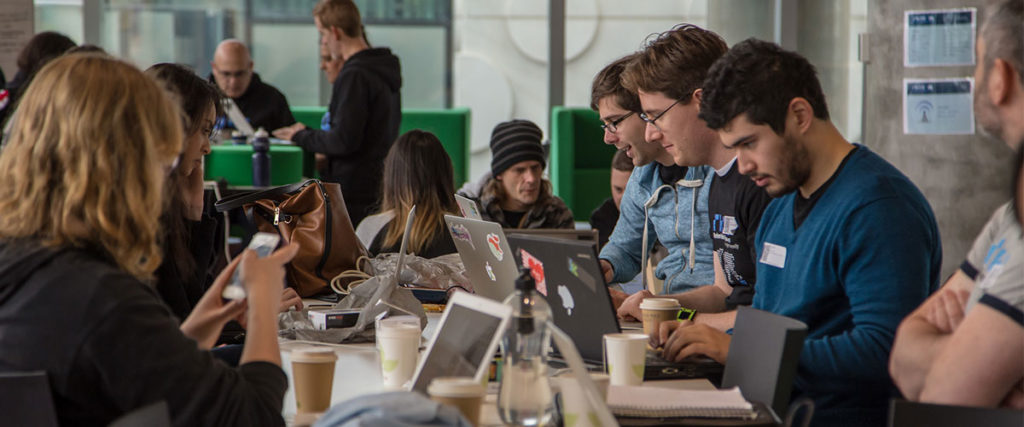Random Hacks of Kindness is Australia’s largest and longest-running hackathon for social good. Twice a year, volunteer techies collaborate with changemakers to help them find digital solutions to pressing real-world problems.
Random Hacks of Kindness (RHoK) is part of a global community of big-hearted technologists who volunteer their time to help changemakers in the community sector (e.g. not-for-profit organisations, charities, and social entrepreneurs) build open-source solutions to the challenges facing society. Emphasising collaboration over competition, RHoK runs free weekend-long hackathons and workshops in various locations across Australia, providing ongoing support throughout the year. Since 2011, they’ve gathered over 500 ‘hackers’ and supported over 100 organisations, including crowdsourcing sensation She’s A Crowd, disability support provider Onemda, and mAdapt, an app that delivers reproductive health information to female refugees.
Eddie Chapman, Community Manager and former CEO of the Association for Children with a Disability (ACD), has worked in the not-for-profit sector for over 20 years, most of which he’s devoted to tackling aged care and disability issues in Victoria. We sat down with Eddie to talk about how Random Hacks of Kindness is ‘hacking for good’ – and the need to strengthen the community sector’s technological capacity in order to cope with pressures today.
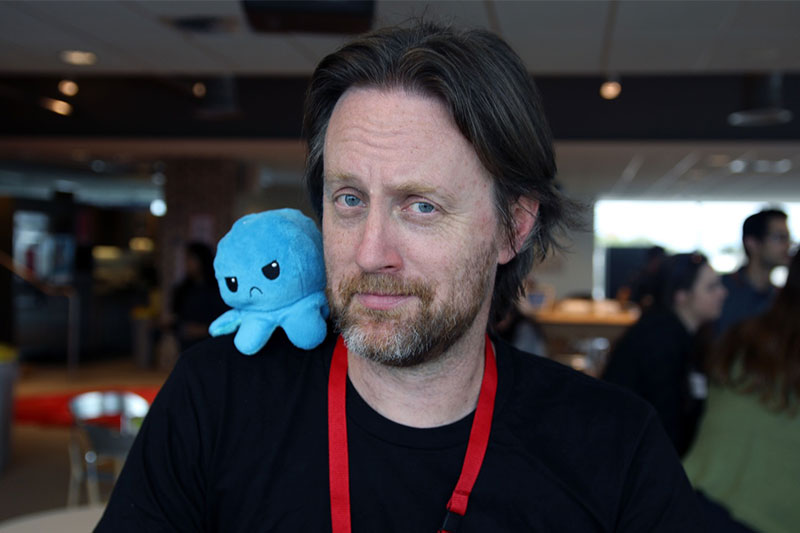
What first piqued your interest in hacking for social good?
When I first got exposed to Random Hacks of Kindness and the whole concept of ‘hacking for good’, I’d worked in the not-for-profit sector for a good 20 years already and was part of a fairly large organisation in Victoria called UnitingCare. At the time, we were trying to create an innovation hub based around client satisfaction, which is very difficult to track in aged care/disability, and we ran out of ideas quite quickly. So I took to the Internet in search of fresh input and that’s when I stumbled upon RHoK’s hackathon event. We came away from that first hack in 2014 with so much more than an effective interface and I’ve been coming back ever since!
Did you have any initial preconceptions around the words ‘hacker’ and ‘hacking’?
I think I was fortunate in the sense that, while I didn’t have a tech background at all, I had enough techie friends and a general interest, really, to know that ‘hacking’ didn’t mean what most people in the NFP sector think it means. Hacking isn’t some sort of nefarious or illicit behaviour. It’s not people in hoodies bringing down the system from their basements. To ‘hack’ is simply to mash things together that weren’t necessarily supposed to go together, in order to create innovative solutions to tricky problems. So it was never a negative trigger in my mind, but it was certainly something I’ve to explain to people, especially senior execs. They tend to get a bit nervous when I say, ‘Hey, I want us to get involved with some hackers’, but once they’ve actually met them, they realise how generous and committed they all are to making a difference in their own time. Any negative views are completely thrown out the window.
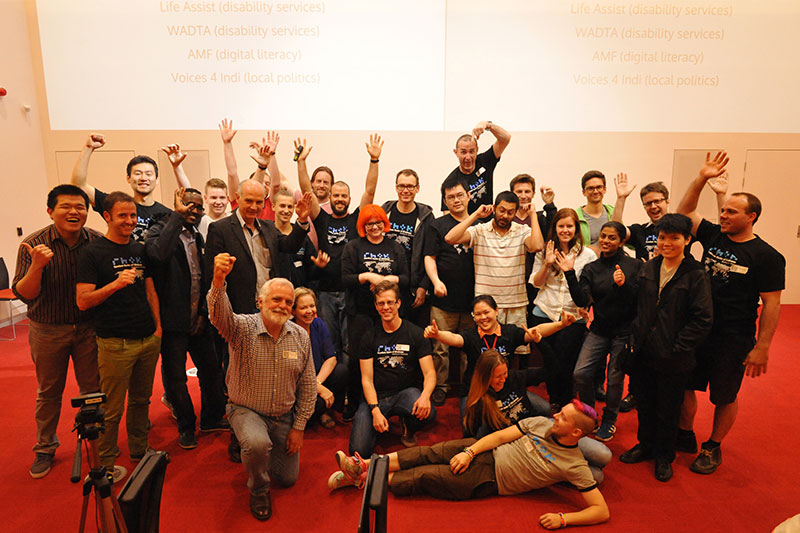
What does Random Hacks of Kindness do?
At the heart of it, Random Hacks of Kindness brings together ‘changemakers’ (ranging from large charities to lone social entrepreneurs) and a community of ‘hackers’ (experts in service design, UX, marketing, graphic design, etc.) over two weekends a year, where they attempt to co-create a solution – or at least, a prototype of that solution – to a problem the changemaker has. Rather than providing software development as a service, we prefer to take our changemakers on a journey that begins roughly 8 weeks prior to the hackathon itself. During this period, we hold brainstorming sessions to help them refine their problem statement and educate them on all things tech sector-related, such as agile or lean methodologies and user-centred design. The changemakers then pitch their problems to hackers who organically form around them depending on their interests and where they can be of value.
This concept is certainly a lot more common now than it was 10 years ago when RHoK started, but I think what sets us apart is the fact that our hackathons are non-competitive. There’s no prize money, no cheesy trophy, just a bunch of do-gooders keen to commit themselves wherever they can. It’s this really loose arrangement where you see people jumping from one team to the next throughout the day. So one team might stand up and say, ‘Hey, we need someone who can do some backend work for us,’ or, ‘Hey, we need someone to help with user testing,’ and everyone will pitch in. It’s less about, ‘We’re going to come up with the best solution out of anyone else,’ and more about ‘How can we make this better for everyone?’ A great deal of conversation happens between changemakers too, where they’re sharing networks and resources. So while changemakers are benefiting in terms of technical expertise and relationships, another key benefit is that people in the tech sector are exposed to the experiences and stories of groups they wouldn’t normally engage with, whether that’s siblings of cancer sufferers, for instance, or a community in East-Timor facing the death of a native language. It’s not so much the solutions people build, but the stuff that happens around the edges that makes RHoK beautiful.
How do you determine which social problems are ‘suitable’ for a hackathon?
We essentially look for ‘Goldilocks’ problems: small enough to solve or achieve meaningful progress in 48 hours, but big enough to make a real difference. And that’s because we do get a lot of extremely ambitious changemakers coming our way and wanting to change the world. That’s literally their pitch sometimes: ‘I want to change the world.’ And we’re like, ‘That’s great; can’t do that in 2 days though.’ One of the most difficult things is turning away changemakers who have these incredible visions, but haven’t yet narrowed it down to that Goldilocks problem. Likewise, we don’t want problems that are so small they can either be knocked off in half an hour or won’t engage the community post-hack. This is about giving hackers something they can sink their teeth into, get excited about and ideally embark on a journey with you for a year or so after the hack.
Having said that, RHoK is looking to broaden what it deems a ‘suitable’ problem. We’re aware that there are plenty of NFPs who just need a little service design work or a new website to help weather COVID-19, so we’re looking to create a new system that supports a range of changemakers at different stages of development.
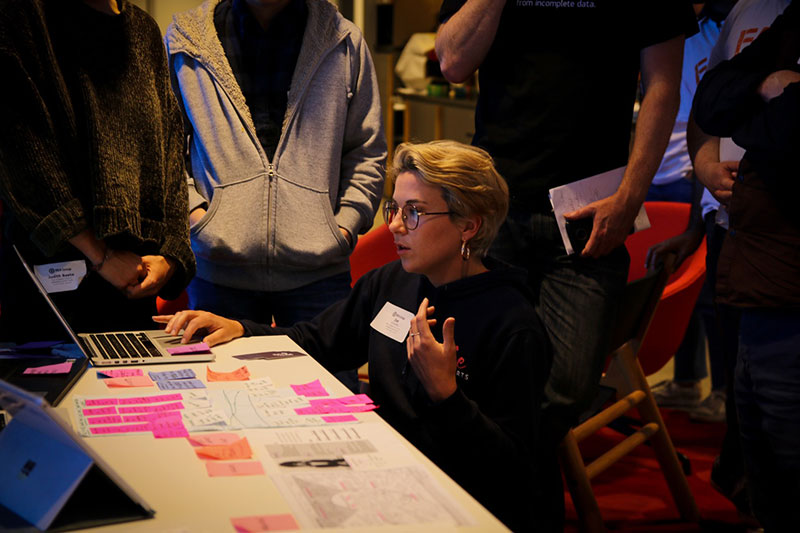
Can you give me some examples of problems RHoK has solved in the past?
One example that’s been really exciting over the years is an initiative called Care to Compare, which began with one guy, Roberto Pietrobon, entirely from scratch. Roberto had been working in refund raising within a healthcare foundation and realised how hard it was to raise money for health charities. Meanwhile, he saw the billions and billions of dollars big insurance brokerage agencies like Compare the Market and iSelect were making out of health insurance in the papers. So he came to us with nothing more than some notes and an idea around creating a competitor to these insurance giants, where all funds are channelled into health charities. Roberto stayed with us for 3 hackathons in a row and his team of 5 people have stuck by him ever since. 4 years later, he now has a great platform that’s creating an alternative for health insurance comparisons, with 100% of profits being donated to health charities in Australia. He still turns up at our hacks every now and again, and we’re so pleased to be part of his project.
Another example I can think of is a problem I brought back when I was a changemaker. Association for Children with a Disability, which I was CEO of, had been leading an initiative called Changing Places, which encourages the construction of fully accessible public toilets for people with severe disabilities who require facilities like hoists and adult-sized change tables. The problem was that we didn’t know the best locations to put these. So we came up with the Goldilocks problem: how do we collect data on where people with disabilities would want them? When we brought that to RHoK, we were immediately surrounded by hackers who went, ‘Oh my God, I didn’t realise this was a problem. Let’s see what we can do to fix it.’ The team found a way of using the things users searched for on the site to help us define where new facilities needed to be. But what was also wonderful was, they interviewed one of our users and did some amazing UX work – which we weren’t even aware existed – and essentially rebuilt our website from scratch. One of the guys accidentally hit the publish button and it went live that day, but it was brilliant.
How do you ensure that the community stays together even after the hackathon?
I’ll be honest — that’s been really hard, especially since we’ve had to park our winter hackathons due to COVID-19. It’s like when people go to a conference: it’s supercharged with passion, but as soon as you walk out the door, everything fades away. In the past, meeting up and staying in contact has generally been up to the changemaker, which is why we’re so careful with the ones we select, but it’s not perfect. The hackathons are still the pinnacle of the RHoK experience, but it’s not the end. So RHoK will be taking a lot more ownership over the post-hack experience this coming year. We’re going to be running RHoK-wide follow up events called ‘RHoLLs’, as well as becoming more structured in measuring outcomes so that changemakers’ solutions are sustainable in the long-term.
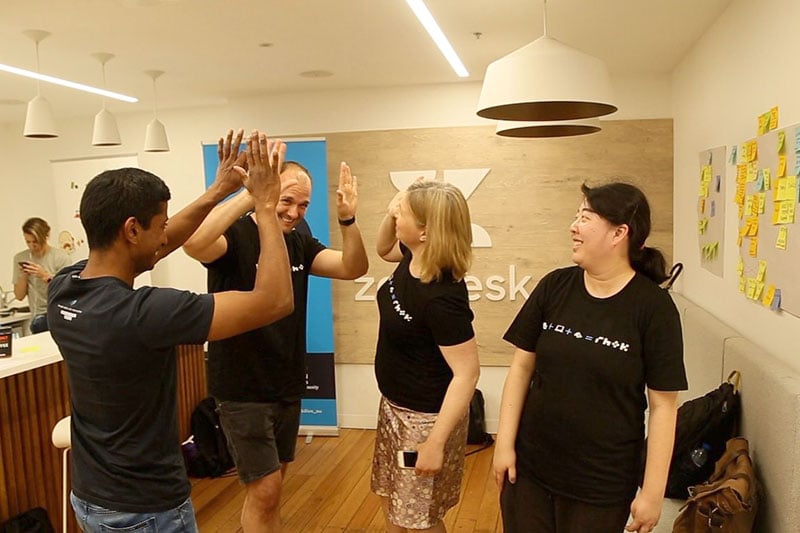
How does RHoK keep up with the increasingly different ways people use technology today?
In the early RHoKs, it was centred very much around coding and building things from scratch. Over the years, however, it’s become rarer to find a ‘pure tech’ coding solution because there are so many free online tools available now. So it’s increasingly about stitching together existing free or affordable tools – like HubSpot with MailChimp – which can be frustrating for hackers who come in wanting to code. But, it’s also what the sector needs because it’s much harder for NFPs to support bespoke code than it is to support something built on Squarespace. I think it also encourages the sector to reckon with other useful concepts like service design, UX and customer journey mapping to help lay down the ‘groundwork’ before actually building the solution itself. Based on the feedback we’ve gotten and in light of COVID-19, we’re currently looking at shifting RHoK’s focus from twice-yearly event-based hackathons to a more journey-based mentoring programme that provides holistic, flexible support to NFPs. We know that changemakers are scrambling at the moment and that some have had to implement 3-year digital strategies in 3 days, so we’re really trying to make ourselves available to NFPs no matter what their needs are, even if it’s as simple as finding the best way to keep client data private while working from home.
Any advice for budding changemakers and hackers?
For changemakers, my advice, first and foremost, is to know who your users are. It sounds crazy to say that when you’re talking about a community-focused sector, but often we don’t understand our audience as well as we think we do, and we risk excluding them from the process. I find that changemakers who bring a member of a client group along and make them the most important person in the room always get a better outcome. The second thing is to trust the hackers and be willing to go along on the ride with them because what you envision going in gets challenged pretty early on. So don’t be afraid to pivot – they can sometimes surprise you with things you’d never thought of. You don’t know what you don’t know!
For hackers, be open-minded about what you think you can contribute. Sometimes you won’t get to play with a cool language or software, but there’s still a human being with a real-life experience and there’s so much value to be gained.
If you are a NFP or for-purpose organisation looking to build your technical capacity and create positive solutions, Random Hacks of Kindness would love to chat with you – even if you’re not sure yet! RHoK are also keen to bring new partners on board. To discover how you can support their vibrant community and connect with changemakers across Australia’s community sector, visit www.rhokaustralia.org/support-us.
Related Articles
The Hacker Exchange: The Woman Teaching Young Minds to Innovate
LUÜNA: Tackling Stigma, Shame & Silence Around Periods Across Asia
Sextech: How is Technology Changing Sex, Intimacy and Shame?
